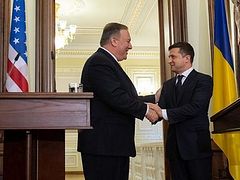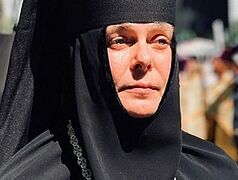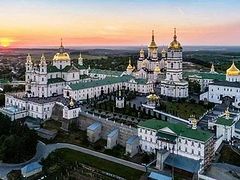Archimandrite Markell (Pavuk) is the confessor and head of the distance learning department of the Kiev Theological Academy and Seminary.
In this interview, Fr. Markell discusses freedom in general and the freedom of the Church in particular, how spiritual freedom and political freedom are related, whether a Christian can be free when the Church of Christ is politically oppressed, and what relations are like between the Ukrainian Orthodox Church and the Ukrainian state today.
 His Beatitude Metropolitan Onuphry. Photo: 112.ua
His Beatitude Metropolitan Onuphry. Photo: 112.ua
—Fr. Markell, how independent is the Ukrainian Orthodox Church in the new political conditions, in the post-Maidan period? How can we describe the current state of Church-state relations?
—Externally, our Church is freer than ever. No one, from among the state officials for example, interferes with the personnel policy of the Church or its liturgical, preaching, and economic activities. In soviet times, and in the Synodal period until the 1917 revolution, this was all under strict control. However, on the other hand, certain politicians, especially during election campaigns, exert very strong pressure, primarily on the Church hierarchy, to win it over to their side. The situation with the imposition of the so-called tomos [of autocephaly, non-canonically granted to the “Orthodox Church of Ukraine” by Patriarch Bartholomew of Constantinople—OC] around the presidential election in 2019 is already well known.
Nevertheless, the majority of the clergy, despite the pressure on them from certain state bodies, honorably withstood this trial, and most importantly—preserved their flock. If some people were sifted out, they were not, by and large, our regular parishioners, but those who would just stop in sometimes, who would come to church just for Baptisms and weddings or for holy water, or to bless honey fruit.1
However, some media outlets and some government representatives still paint an image in the eyes of society of the Church of Christ as an enemy against which physical methods of influence can be employed. Such a state of affairs speaks eloquently not only of the violation of the rights and freedoms of believers, but also creates in the country an atmosphere of selectivity, hatred, and anger towards people with different religious beliefs. This is discrimination on religious grounds, which has no place in a civilized state.
—If you compare the freedom of the canonical Ukrainian Church and the freedom of the [schismatic] “Orthodox Church of Ukraine” (OCU) and the Ukrainian Greek Catholic Church (UGCC), what’s the difference?
—These structures seem to enjoy external freedom more than we do (none of the authorities oppress or persecute them), but they somehow remind me of the state of religions in the USSR. That is, their clergy must conform to the general line of the political course our state is currently following in all their words and deeds.
If, for example, it comes down from above that the “Russian world” is bad, then God forbid that anyone would dare to praise it or not condemn it! They’ll immediately accuse you of betraying national interests, and they’ll find dozens of people to take your place who won’t deviate from the “general course.” But our clergy have complete freedom in their attitude towards politics, or rather: No matter how much pressure is put on us, we don’t even want to include these issues in the agenda of our ministry.
For us, the most important thing is to raise worthy citizens of the Heavenly Fatherland. As Blessed Augustine says, only a worthy citizen of the Heavenly city can be a worthy citizen of an earthly city. National symbolism, language, and culture become relevant and inspiring for creative work only when their bearers are guided by the Ten Commandments of the Law of God, or at least by the voice of the conscience. If God’s law is trampled under national banners, then these things cease to have a sacred meaning. In that case, figuratively speaking, it would be easier to hang a black pirate flag with a skull and crossbones. It would be more honest.
—Tell us, Father, what freedom was Christ speaking about when He said: And ye shall know the truth, and the truth shall make you free (Jn. 8:32)? And how can we relate the “freedom” of the aforementioned confessions with this saying of the Lord?
—Truth is Christ Himself. But many are hindered from knowing the Lord by the sins and passions of pride, avarice, lust, and anger. They make a man unfree—a slave to sin and vice.
When a man struggles against them and turns to Christ for help, then he becomes not declaratively, but truly free. Can we really call a man free who can’t go a day without alcohol or who is ready to gnaw someone else’s throat for money, or who can’t be faithful to his wife because of the lust of the flesh, or who even in church builds his Church life on anger towards the neighboring state?! It’s practically impossible to push someone chaste, sober, and generous into any lawless deeds. He will not betray or frame anyone or get them in trouble and will not participate in dubious political projects.
—Our churches are being seized and the Church is accused of being pro-Russian. It has gotten to the point that Parliament tried to pass a law to ban and rename the [canonical] UOC (this doesn’t affect the Greek Catholics and adherents of the OCU). Does that mean we are not free politically but free spiritually?
—I think the main role in this process is played not so much by high ideals of patriotism, but by basic human envy. The OCU and UGCC are terribly irritated by the fact that, as opposed to them, we enjoy relative external and internal freedom after the fall of the USSR. Therefore, we are accused of all kinds of political bias, they try to seize our churches, they call us Muscovites,2 and they threaten to expel us from Ukraine. But the paradox of the spiritual life is that the more they try to enslave us outwardly, the more inwardly free we become.
External freedom, as St. John Chrysostom pointed out in the fourth century, is not always good, because it can contribute to excessive spiritual enervation, and such a person is easily enslaved to the evil one, and is made unfree.
—You have said you pity such people because they are deprived of truth and freedom. We treat them as wayward brothers, and but they treat us like enemies. Why?
—I feel sorry for them first of all because they are sincerely deceived. Most of my relatives and friends live in Western Ukraine. I know that the majority of Galicians are honest, generous, and very hardworking people, who would never tolerate weeds growing in their garden or a dirty and disorganized house. Compared with other regions of Ukraine, Galicia doesn’t have such a large percentage of broken families. The people try to make sure they’re at Liturgy every Sunday and on every feast day. But together with these undoubtedly positive facts, politicians systematically and deliberately try to sow the seeds of hatred and distrust there for those who want to be in unity with the Orthodox Church, who pray for the Patriarch of Moscow. But don’t anger, distrust, and suspicion devalue all their other virtues?! That’s why I pity them.
—His Beatitude Metropolitan Onuphry often repeats that a man acquires freedom in God, in battling sin within himself personally. Can you comment on these words of the primate, about how they can be implemented in the life of a Christian?
—We already spoke about this above. The thing is, it’s sin, not being Russian, European, or American that makes people unfree. This is the constant message of nearly all of His Beatitude’s homilies. Every time we confess it frees us from sin and makes us free to love not just our family, our people, our state, but also all people regardless of nationality. In Christ there is neither Jew nor Greek, there is neither bond nor free (Gal. 3:28). He loves everyone and desires that everyone—not just particular peoples—would be saved and inherit the Kingdom of Heaven.
—As the head of the distance learning department of the Kiev Theological Academy and Seminary, you have a lot of communications with the clergy, most often coming from the hinterlands and from abroad. What do you talk about? What topics are they concerned about? Do you touch on this theme of freedom?
—The first thing I ask those who come from Eastern Ukraine, from Donbass, is whether they’ve stopped shooting, when all this bloodshed will stop. Interestingly, there are as many opinions as there are people. Some are optimistic and say that peace is just around the corner, while others are pessimistic and believe the fighting will last a long time.
Those who serve abroad say it is very difficult for their flocks to realize their sinfulness; many can’t endure even the slightest remark in their direction. So the topic of freedom is relevant for everyone.
—Orthodox elders of the twentieth century, such as St. Lawrence of Chernigov, have said that the churches will open and be built in grandeur and beauty, but people will not be able to go to them, or there will simply be no one to go. What is this about? Is it, for example, about churches seized by OCU supporters? After all, they stand half-empty. Does this apply to our Church?
—I think that St. Lawrence, unlike us sinners, looked at the world holistically. The impoverishment of piety occurs both because of the schism and because of the general impoverishment of the spiritual life. For example, many priests noticed that after the Maidan [revolution] in 2013-2014, the number of Baptisms, weddings, and confessions decreased several times over. To some extent, this is due to the fact that the those who would just drop in, who would come to church only on Pascha and Nativity or to participate in the Sacraments we mentioned or for other blessings, were sifted out. For them, the gossip of politicians and journalists became more important than the authority of the Church. Some of them go to the schismatics now for these services, but most of them don’t trust anyone at all and confidently say they have “God in their hearts.”
Taking advantage of the disruptions in Church life, Protestants and sectarians, who have always been energetic in their preaching, significantly stepped up their influence. Through the media and especially the internet, they managed to instill in many a disdainful attitude towards the clergy, and especially towards the Sacraments and services. Practically every Orthodox social media group has some sectarian entrenched in it, who, taking advantage of the ignorance of many Orthodox Christians of the basics of the faith, sows his ideas, which are difficult for the majority of people to logically disagree with.
—And a couple of somewhat off-topic questions. They say that the majority of theology students today want to stay in the cities. Is this the case, and if so, how can you explain this? How can we relate this fact to the freedom of which Christ spoke?
—I think that in this case, their faith and freedom in Christ are overcome by their passionate youth and the desire for a well-established, comfortable life. Additionally, there are few beautiful young women who want to follow their husband to some remote village. But, unfortunately, acquiring the world with its lusts and passions, such people lose the most important thing—the special grace of God—and they become not reverent priests, whose ministries, according to St. John Chrysostom, are envied even by the angels, but ordinary priests just serving at people’s request, who quickly get tired of their ministry and burn out mentally, and some even give up their holy orders.
 Cross procession in Kiev, 2016
Cross procession in Kiev, 2016
—And in conclusion: Our Church in Ukraine is accused of all the mortal sins, of political dependence on Russia—and yet it is growing in number, in the number of parishes and monasteries. It’s enough to recall the cross processions with hundreds of thousands of people. Are they really all “victims of Putin propaganda,” or is it something else altogether?
—Indeed, despite some impoverishment in the spiritual life, our Church is blessed and alive, for it was created not by politicians before an upcoming election, but by Christ Himself. The people have long ago gotten sick of political battles that incite and whip up enmity and distrust between Orthodox peoples. They want peace, ascetic podvig, and victory not over others, but over themselves and their passions. During the processions, you can escape from the daily hustle and bustle with its many problems and fully devote yourself to prayer and repentance, to the testimony of the true faith.





